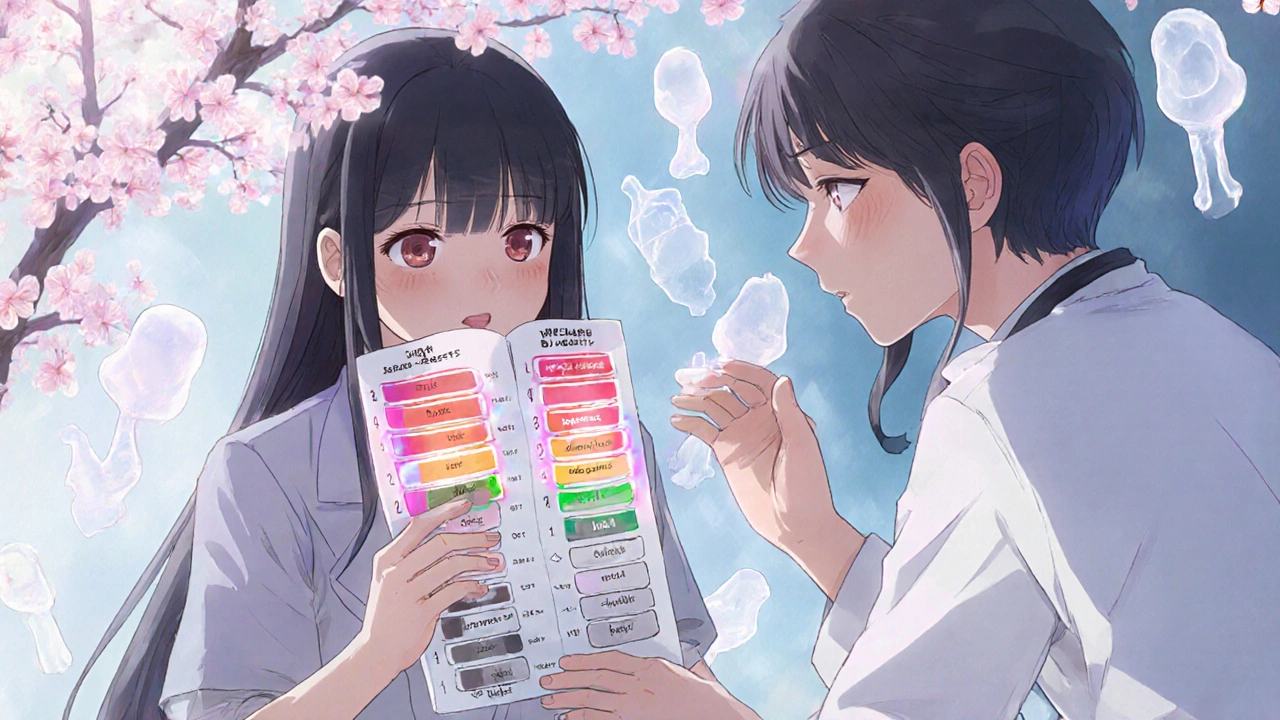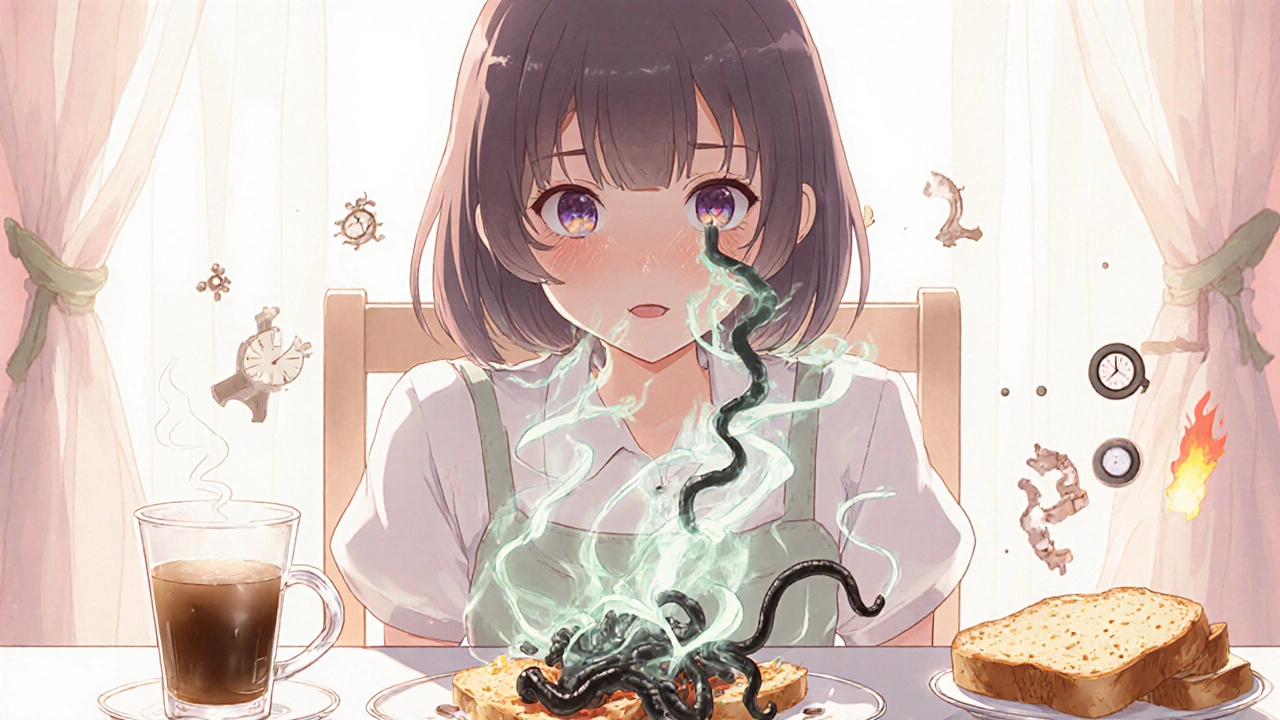Medication Smell Risk Checker
Check Your Medication Risk
Enter your medication name or select a category to see if it may cause smell/taste changes (dysosmia).
Recovery Timeline
Based on research, of cases resolve within after stopping the medication.
Important: Symptoms lasting more than 4 weeks should prompt consultation with an ENT specialist.
Have you ever taken a medication and suddenly noticed that your favorite food tastes like metal, smoke, or rotten eggs? Or maybe you smell something burning when there’s no fire nearby? If so, you’re not alone-and it’s probably not in your head. This strange, often disturbing change in smell or taste is called dysosmia, and it’s a real, documented side effect of many common medications. It’s not rare. It’s not imaginary. And it’s way more common than doctors realize.
What Exactly Is Dysosmia?
Dysosmia means your brain is misreading smells. It’s not just losing your sense of smell-that’s called anosmia. Dysosmia is when things smell wrong. Coffee might smell like sewage. Bread might taste like gasoline. A fresh shower might leave you smelling like a burnt tire. Sometimes, you smell things that aren’t there at all. These aren’t hallucinations in the psychiatric sense. They’re physical changes in how your nose and brain communicate.
It’s not just about food. People with dysosmia often can’t smell smoke, gas leaks, or spoiled milk. That’s dangerous. One patient in a 2021 case study missed a gas leak because everything smelled like rotten eggs-even when there was no gas. That’s the kind of risk no one talks about.
Which Medications Cause This?
Over 500 medications have been linked to smell and taste changes, according to MedLink Neurology’s 2022 update. But some are far more likely to cause trouble than others.
Antibiotics are the biggest offenders. Fluoroquinolones like levofloxacin and moxifloxacin, and macrolides like azithromycin and clarithromycin, are frequently blamed. These drugs interfere with zinc and magnesium levels in your nose, which are critical for smell cells to regenerate. One study found people taking levofloxacin were 2.5 times more likely to develop smell distortion than those not taking it.
Heart medications like midodrine (used for low blood pressure) can also trigger it. The mechanism isn’t fully understood, but it likely affects nerve signaling in the olfactory system.
Antidepressants and antiseizure drugs like carbamazepine and sertraline are another major group. Sertraline, for example, can slip into the membranes of smell cells and mess with their electrical signals. Carbamazepine has even caused complete loss of taste in some cases.
Even IV drugs like lidocaine and iron infusions can cause an instant metallic taste-sometimes within minutes. That’s not a coincidence. It’s a direct chemical reaction.
Why Does This Happen?
It’s not one cause. It’s a mix of biological sabotage.
Some drugs block odor receptors from working properly. Others stop the body from turning off those receptors after they’ve fired. Think of it like a light switch that won’t turn off-you keep seeing light even when you flip the switch. That’s what happens with smell signals in dysosmia.
Some medications interfere with G-proteins, TRPM5 channels, or calcium flow inside smell cells. These are the tiny molecular switches that tell your brain, “This is coffee,” or “This is spoiled milk.” When those switches get jammed, your brain gets confused.
And here’s the kicker: your smell cells regenerate every 30 to 60 days. But if a drug keeps damaging them as they try to grow back, the cycle never fixes itself. That’s why some people’s symptoms last for months-even after stopping the drug.

How Common Is It-and Why Is It Overlooked?
Dr. Richard L. Doty from the University of Pennsylvania estimates that 20% of all smell disorders come from medications. That’s one in five people with smell problems. Yet, only 37% of primary care doctors routinely ask about smell changes during medication reviews, according to a 2022 JAMA survey.
Why? Because no one asks. Patients don’t think to mention it. Doctors don’t think to check. It’s not on the checklist. One patient in a Reddit thread wrote, “I told my doctor my food tasted like garbage. He said, ‘Maybe you’re just depressed.’” That’s the problem. It’s dismissed as psychological.
But it’s not. A 1995 study found that 30% of people with medication-induced dysosmia lost significant weight because they couldn’t eat. Another study showed 68% of people on Reddit who reported drug-related smell changes still had symptoms after stopping the medication.
What Can You Do?
If you suspect a medication is changing your smell or taste, don’t panic-but don’t ignore it either.
Step 1: Track the timing. Did the smell change start within 7 to 14 days of starting a new drug? That’s a strong clue. Antibiotics often cause symptoms around day 10. If it lines up, that’s not random.
Step 2: Don’t stop your meds without talking to your doctor. Some drugs, like antibiotics for serious infections or blood pressure meds, can’t be stopped abruptly. Work with your provider to weigh risks.
Step 3: Ask for a smell test. The University of Pennsylvania Smell Identification Test (UPSIT) is a 40-item scratch-and-sniff test doctors can use to confirm impairment. It’s not perfect, but it’s better than guessing.
Step 4: Consider alternatives. If you’re on azithromycin and your food tastes like ash, ask if another antibiotic is an option. Sometimes switching from levofloxacin to amoxicillin makes all the difference.
Step 5: Avoid zinc supplements unless tested. A lot of online advice says “take zinc.” But Dr. Thomas Hummel of the University of Dresden warns that zinc doesn’t fix drug-induced dysosmia-it only helps if you’re actually deficient. Taking too much can cause copper deficiency, nerve damage, and worse.
Will It Go Away?
Good news: most people get better.
According to the original 1995 Schiffman and Nagle study, 78% of cases resolve within three months of stopping the medication. In Medindia’s 2023 survey of over 400 patients, 65% saw improvement within four weeks after quitting the drug.
But 22% don’t. For them, it can drag on for months or even years. One Reddit user described a 22-month battle after azithromycin, losing 15% of body weight because everything tasted like rotten eggs.
There’s hope on the horizon. Phase II clinical trials are testing new drugs that target TRPM5 channels-the exact molecular pathway disrupted by many antibiotics. If they work, we could have the first treatments designed specifically for medication-induced dysosmia.

What’s Being Done to Fix This?
This isn’t just a patient problem-it’s a system problem.
The FDA now recognizes smell and taste changes as underreported side effects. In 2021, they released guidance asking drug companies to include these symptoms in clinical trials. AstraZeneca even patented a treatment for drug-induced smell loss in 2022.
The European Medicines Agency plans to require smell and taste testing in all Phase III trials for antibiotics and heart drugs starting in 2024. That’s huge. It means future drugs will be screened for this before they hit the market.
And the Global Chemosensory Research Consortium has already enrolled over 1,200 patients from 14 countries in a registry to track these cases. That’s the first step toward real data-and real solutions.
When to See a Specialist
If your smell or taste changes last more than four weeks after stopping the medication, see an otolaryngologist (ENT doctor) who specializes in smell disorders. Primary care doctors aren’t trained to handle this. But specialists have tools, tests, and sometimes treatments that can help.
Organizations like the Smell and Taste Treatment and Research Foundation and Fifth Sense offer directories of specialists and free support groups. You’re not alone. Thousands of people are going through the same thing.
The Bigger Picture
Dysosmia isn’t just about food. It’s about safety. It’s about dignity. It’s about being able to enjoy a meal with your family again. It’s about knowing when your smoke alarm is real-and not just your brain playing tricks.
For too long, this has been ignored. But the science is clear. The numbers are real. And patients are speaking up.
If you’ve had a strange smell change after starting a new drug, write it down. Note the date. Tell your doctor. Demand a smell test. You’re not overreacting. You’re paying attention-and that’s the first step to getting better.


Bartholemy Tuite
November 24, 2025 AT 20:08Man i remember when i took azithromycin for a chest cold and everything smelled like burnt plastic for weeks. thought i was going crazy till i read this. no one believes you until you describe it right. even my wife thought i was being dramatic. turns out she had it too after her antibiotics but never connected the dots. we both lost 10 lbs just avoiding food. glad someone finally put this out there.
Nikki C
November 25, 2025 AT 14:07it’s wild how the body turns against you like this. not just the taste but the loneliness of it. you sit down for dinner and your favorite curry smells like a sewer pipe. your kid asks why you’re not eating and you just nod. no words. no explanation. because even doctors shrug. this isn’t anxiety. it’s biology gone rogue.
steven patiño palacio
November 26, 2025 AT 09:04Thank you for writing this with such precision. The molecular mechanisms involving TRPM5 channels and G-protein interference are under-discussed in clinical settings. Many patients are dismissed as hypochondriacs when their olfactory epithelium is being chemically disrupted. The 2022 JAMA survey showing only 37% of PCPs screen for smell changes is a systemic failure. We need mandatory otolaryngology referrals after persistent dysosmia beyond 14 days.
Akash Chopda
November 26, 2025 AT 15:31zinc is a coverup the pharma companies dont want you to know about. they know it helps but they dont sell it so they silence it. they want you to stay sick so you keep buying pills. your smell is a signal your body is trying to tell you something. listen to it not the doctor
stephanie Hill
November 27, 2025 AT 14:14so now we’re supposed to believe the government and big pharma are secretly testing smell-destroying drugs on us? why? to make us eat more processed food? to keep us docile? i mean… look at the timeline. right after the pandemic they started pushing all these new antibiotics. coincidence? i think not. also did you know they put fluoride in the water to dull your senses? it’s all connected.
Rachael Gallagher
November 29, 2025 AT 02:59if you’re not american you don’t get real healthcare. my cousin in india took levofloxacin and lost her sense of smell for 18 months. she went to a clinic and they gave her painkillers. here? they’d give you a therapy referral. we’re so broken.
Victoria Stanley
November 30, 2025 AT 13:19As someone who works in sensory neurology, I’ve seen this too many times. The key is timing-symptoms usually emerge 7–14 days after starting the drug. That window is critical. If you catch it early and switch meds, recovery is way faster. Also, don’t ignore the metallic taste from iron infusions-it’s not ‘just a side effect,’ it’s a red flag. Ask for UPSIT. It’s simple, free, and tells you more than a hundred MRIs.
Alex Dubrovin
November 30, 2025 AT 14:21i took sertraline for anxiety and suddenly my coffee tasted like battery acid. stopped it cold turkey. took 3 months to get back to normal. worst part? my therapist said it was 'emotional residue' from trauma. i just wanted to eat toast without crying.
Adam Hainsfurther
November 30, 2025 AT 18:55There’s a cultural blind spot here. In many communities, especially immigrant families, discussing bodily changes like smell is taboo. My mother took clarithromycin and stopped eating for six weeks because she thought she was 'contaminated.' She didn’t tell anyone until she collapsed. Language barriers, shame, fear of being labeled 'crazy'-these are the real reasons this goes underreported. We need community health advocates, not just clinical guidelines.
Andy Louis-Charles
December 1, 2025 AT 03:15just wanted to say thanks for posting this. i had it after lidocaine IV. metallic taste for 3 weeks straight. no one knew what i was talking about. even my dentist thought i was joking. i’m glad i’m not alone. also… 🤢
Douglas cardoza
December 2, 2025 AT 06:33bro i took moxifloxacin and suddenly my girlfriend smelled like a dumpster behind a gas station. i broke up with her because i thought she was gross. turned out it was the drug. we got back together after 4 months. she didn’t even know. we still laugh about it now. but man… that was rough.
Neoma Geoghegan
December 3, 2025 AT 12:13TRPM5 disruption + zinc dysregulation = olfactory chaos. stop taking zinc unless serum levels are confirmed low. it’s not a cure. it’s a risk. if you’re on antibiotics and your food tastes like burnt rubber-document it. screenshot the med label. email your doctor. this isn’t noise. it’s data.
Jacob McConaghy
December 5, 2025 AT 11:37my dad had this after midodrine. couldn’t smell smoke. house nearly burned down. he didn’t wake up until the neighbor called 911. he’s fine now but we never talk about it. i’m glad this is out there. people need to know-this isn’t just weird. it’s life-threatening.
Vineeta Puri
December 6, 2025 AT 09:24As a healthcare provider with over 20 years of clinical experience, I urge all patients to maintain a symptom diary when initiating new medications. Note the date, the specific olfactory alteration, and the timing relative to dosing. This data is invaluable for clinicians who are often unaware of this side effect. Additionally, I recommend requesting the UPSIT test as a baseline before and after medication changes. This is not an overreaction-it is responsible self-advocacy. You are not alone, and your experience matters.